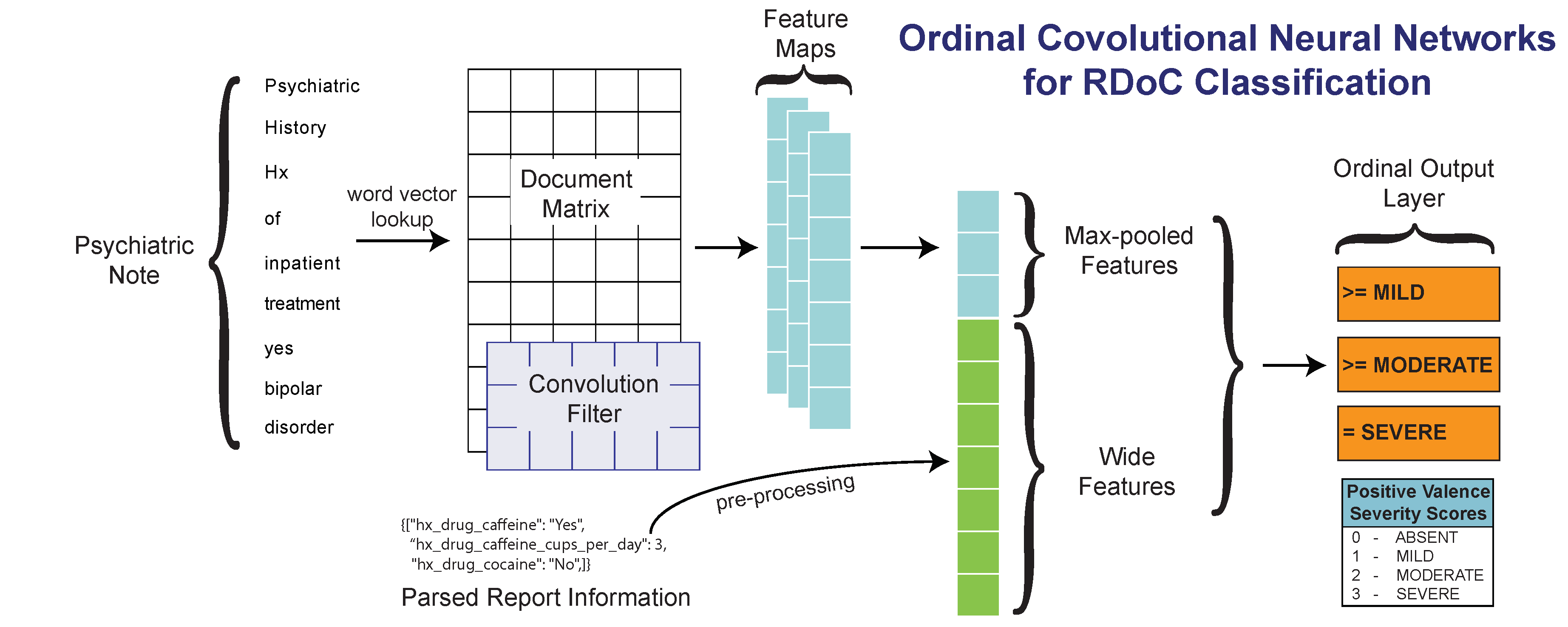Ordinal Convolutional Neural Networks for Predicting RDoC Positive Valence Psychiatric Symptom Severity Scores
Anthony Rios and Ramakanth Kavuluru.
Journal of biomedical informatics 75 (2017): S85-S93.
Abstract:
Background
The CEGS N-GRID 2016 Shared Task in Clinical Natural Language Processing (NLP) provided a set of 1000 neuropsychiatric notes to participants as part of a competition to predict psychiatric symptom severity scores. This paper summarizes our methods, results, and experiences based on our participation in the second track of the shared task.
Objective
Classical methods of text classification usually fall into one of three problem types: binary, multi-class, and multi-label classification. In this effort, we study ordinal regression problems with text data where misclassifications are penalized differently based on how far apart the ground truth and model predictions are on the ordinal scale. Specifically, we present our entries (methods and results) in the N-GRID shared task in predicting research domain criteria (RDoC) positive valence ordinal symptom severity scores (absent, mild, moderate, and severe) from psychiatric notes.
Methods
We propose a novel convolutional neural network (CNN) model designed to handle ordinal regression tasks on psychiatric notes. Broadly speaking, our model combines an ordinal loss function, a CNN, and conventional feature engineering (wide features) into a single model which is learned end-to-end. Given interpretability is an important concern with nonlinear models, we apply a recent approach called locally interpretable model-agnostic explanation (LIME) to identify important words that lead to instance specific predictions.
Results
Our best model entered into the shared task placed third among 24 teams and scored a macro mean absolute error (MMAE) based normalized score ( ) of 83.86. Since the competition, we improved our score (using basic ensembling) to 85.55, comparable with the winning shared task entry. Applying LIME to model predictions, we demonstrate the feasibility of instance specific prediction interpretation by identifying words that led to a particular decision.
Conclusion
In this paper, we present a method that successfully uses wide features and an ordinal loss function applied to convolutional neural networks for ordinal text classification specifically in predicting psychiatric symptom severity scores. Our approach leads to excellent performance on the N-GRID shared task and is also amenable to interpretability using existing model-agnostic approaches.

@article{RIOS2017S85,
title = "Ordinal convolutional neural networks for predicting RDoC positive valence psychiatric symptom severity scores",
journal = "Journal of Biomedical Informatics",
volume = "75",
pages = "S85 - S93",
year = "2017",
note = "A Natural Language Processing Challenge for Clinical Records: Research Domains Criteria (RDoC) for Psychiatry",
issn = "1532-0464",
doi = "https://doi.org/10.1016/j.jbi.2017.05.008",
url = "http://www.sciencedirect.com/science/article/pii/S153204641730103X",
author = "Anthony Rios and Ramakanth Kavuluru",
keywords = "Text classification, Ordinal regression, Convolutional neural networks, Research domain criteria, Model interpretability"
}